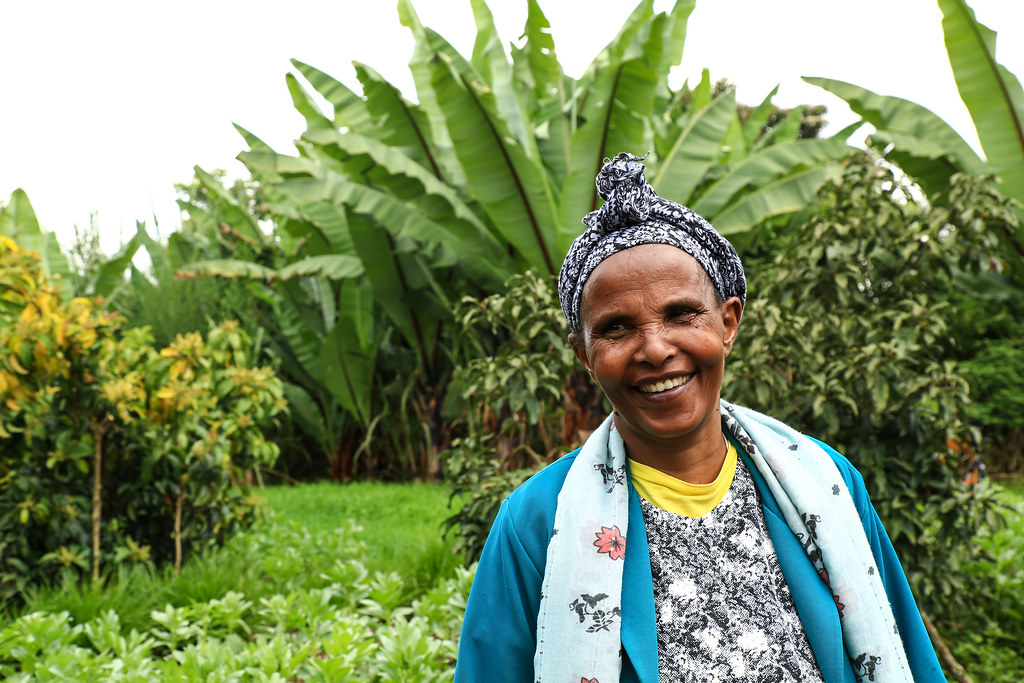Bekelech Belachew secures her family’s livelihood by farming improved forages
With support from the United States Agency for International Development (USAID), the Africa RISING program in Ethiopia has been increasing smallholder farmers’ access to, and use of, consistent, affordable and high-quality animal feeds. The availability and use of high-quality feeds has a direct impact on the livelihoods of livestock producers in smallholder-mixed crop-livestock systems because it makes animal husbandry more productive and efficient enabling farmers to produce more milk meat and eggs, which they consume to improve their nutrition and sell to increase their incomes.
The African RISING Feed and Forage Technology project has been offering technical training and in-kind grants to smallholder farmers in four regions of Ethiopia Amhara, Oromia, Tigray and Southern Nations, Nationalities, and Peoples’ Region (SNNPR) since 2013. Many farmers, particularly women, have benefited from this training and support. So far, the project has benefited 216,545 farmers, 21% of whom are women.
Fodder beet participatory varietal selection, desho grass and vetch intercropping, dual-purpose oat evaluation and sweet lupin supplementation are the main forages technologies provided to farmers by the project to enhance animal nutrition and feeding.
These feed and forage technologies, which have been validated by Africa RISING, have improved feed resource availability and quality, and livestock productivity in households in the four regions. In addition, the project’s interventions have raised awareness of the importance of cultivated forages and improved farmers’ skills in growing them, resulting in a growing demand for different feeds and forages in the regions. To satisfy this demand and strengthen the Africa RISING initiatives across other agro-ecologies, the project is testing and validating alternative feed and forages for different climatic and farm contexts. It has also been training farmers and extension officers to address capacity gaps.
Recently, the project recognized the achievements of ‘champion’ women farmers to inspire them and encourage more farmers to adopt these feed and forage technologies. The project awarded 27 women who are using these forages and other improved technologies (such as water ponds, solar pump storage sheds and feed troughs) in Hossahan, SNNPR.
Bekelech Belachew, a farmer in Jaw Kebele near Hossanna town, was recognized for her achievements during an Africa RISING farmer’s field visit day in the town on 5 November 2019.
Bekelech received training from Africa RISING on avocado farming, forage production and feeding management. She also took part in experience-sharing visits to other farms and received forage seeds and planting materials from the project. She says that support from Africa RISING has been key to her success.
‘Before I gained these skills, I struggled in my farming activities. But the experience-sharing visits made me see that I could do more in agribusiness. My eyes were opened to see new opportunities in my neighborhood, not just in my farm.’
She now grows different types of forages: alfalfa, vetch, oat, desho and elephant grass in her half-hectare piece of land. With improved forage and management practices such as mixing legumes and using pond water, solar pumps and feed troughs, she has increased the amount of milk she collects daily from each of her four cows from 4 to 10 litres. She sells the milk to customers directly for ETB 12,000 (USD 374)/month.
Bekelech has also started and is leading a savings group in her neighbourhood with the inspiration she found from the experience-sharing visits in the Africa RISING site in Enadmhoni, Tigray. The saving group has 200 women members and supports initiatives such as small-scale seed multiplication
Bekelech is self-reliant and committed to bringing positive change to her life. She is a role model for other women in her community.
Watch this short film to learn more about the Africa RISING fodder and forage research in Ethiopia.





